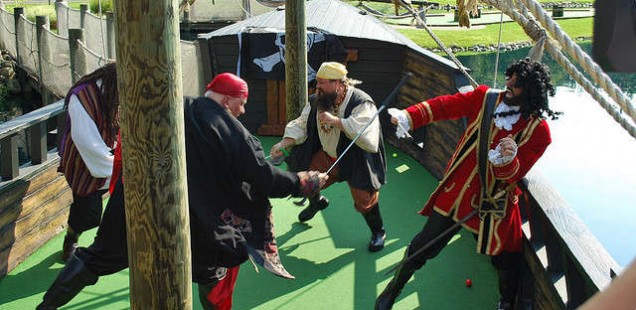What is happening in the Pirate Party of Germany? | PirateTimes

What is happening in the Pirate Party of Germany?
After the Pirate Party of Germany’s meteoric rise between 2009 and 2013 the party seems to be in decline and staggering from crisis to crisis. The latest being “bombergate” in which two young women took part in an anti-neonazi protest. Their faces were masked and they were topless – Femen style. One had the words “Thanks Bomber Harris” written on her body.
Bombergate
One of the women was unmasked in the press as Anne Helm, who was fifth the PPDE list for the European Elections. The Federal Party Board, decided to stand by Anne as she came under threat from neo-fashists. There was no question of the board removing her from the list. It was too late even if they wanted to. This caused outrage in some parts of the Party and five state parties issued statements in opposition to the board’s position. Many members resigned from the Party. Also there was a strike by the Party’s IT and administrative departments, all trying to force the leadership to take a political stance. These actions led to the immediate resignation of half of the board members. This left the board unable to function and a caretaker administration was put in place until the special general assembly to be held in Halle 27 – 29th June 2014.
The German Context
Bombergate was not the sole cause of the reaction. There was
Another thing we need to know, to understand why such a reaction was provoked, is who Bomber Harris was and why he still evokes strong emotions in Germans. Arthur Harris was responsible for mass area bombing of cities where the targeting of the civilian population was deliberate and the aim was to start a fire storm to ensure maximum casualties. Many regard him as a war criminal. In Hamburg 42,600 people lost their lives and in Dresden 25,000 (the city where the incident with Anne Helm occurred). Modern Germans have ambiguous feelings toward the war, having an inherited guilt for the Nazi atrocities and anger at the retaliation perpetrated on their parent’s and grandparent’s generation.
Any politically active person, who even refers to the Nazi era is courting danger. It is still illegal to promote Nazi propaganda and the Germans are very sensitive about the whole subject. In a previous incident a PPDE official, who compared the speed of the rise of the Party to the National Socialists, was severly criticized. The Bombergate action was designed to be rebellious, but the effect was not intended to be on the Pirate Party.
Former federal chairman Sebastian Nerz described the Party as being social-liberal. This combines, fairly well, the humanitarian, communitarian tendency of the Party’s left wing and the individualist, laissez faire bias of the right wing. In effect the Party, although having members with varying opinions, presents a neutral face to the voters. The right wing is now fearful that the recent events mean a shift to the left.
Tensions
During its rapid growth the Party has attracted people from all parts of the political spectrum. Most of all those concerned with the way the Internet was being increasingly influenced by governments and corporations. For example anarchists and neo-liberals who, while both want to see less state interference in individual lives, have a very different world views. The result is a constant internal tension. Most of the time this is a good thing, as new ideas can be tested in an intellectual struggle with reasoned argument and mutual respect. The result is good, well thought out and innovative policies. The danger is that at any moment people can split along the old divisions and attack each other. In an atmosphere, where trolling is regarded as a legitimate form of free speech and character assassination and bullying are ignored, the sensible resolution of differences is difficult.
A Democratic Deficit?
In a party structure, the ideal is to sit down and come to a concensus over policies and manifestos to bring to the public. In the state and electorate level meetings, coming to concensus is relatively easy but at the federal level it is more difficult. To vote on federal policy and party officials one must attend the general assemblies. This is more difficult for a large number of Party members as travel distances and costs increase the further away the meetings are held. This means the GA’s are self-selecting towards the wealthier end of the Party and also those who are able to take time off from work and family commitments.
Liquid Feedback instances have been implemented at federal and state levels, intended as straw polls for the leadership and candidates. However, these are not being used on the federal level as they have no democratic validity – not being drawn from the whole party . Last year an attempt to institute a permanent online general assembly was narrowly defeated; meaning the power remained with the physical GA.
It would seem that there is a kind of democratic deficit in the Party, which is unfortunate in a party that wants to see increased citizen participation in politics. This leads to a large amount of frustration that cannot be easily voiced. The result becomes political games inside the Party open to all extremes (including trolling and vicious personal attacks of death or rape threats). Some of this can be blamed on trolls sabotaging and infiltrators from other parties or organisations (who are threatened by Pirate politics). However, there is a systemic problem that makes the internal workings of the party prone to a self-destructive strife.
From a Chaotic Beginning
During the party’s growth period the party formulated innovative policies under a leadership that itself was finding its own way. This resulted in a party that was not ideologically fixated but drew from a wide range of philosophies. The leadership reflected this back to the party, the public and the press. In the following general assemblies a collective decision was made to fix the path of the party towards a more narrow path. There were several good reasons for this including that larger meetings were not getting much work done as more and more voices clamoured to be heard.
To a Chaotic Present
Now the party is at a crossroads. Which direction they will take will not be decided in Halle. They will have to vote a new board but those board members will have to guide the party through a process of discourse, mutual respect and understanding. Only the party itself can make the needed changes through a completely open and democratic process. One thing they might want to consider is a code of conduct. One that includes “not bringing the party into disrepute” in public and “politeness and respect” in dealing with each other.
Opinions
The founder of the first Pirate Party, Rick Falkvinge, said:
Every now and then it’s being questioned why the Pirate Party chose the political route to safeguard privacy and other liberties, as well as reform those monopolies that stand in its way, such as the copyright monopoly. The answer is simple: activism isn’t enough.
Editors comment:
We are a party, one that wants to see our candidates elected and other parties adopting our policies.
- We do not break the law, although we may sympathise with those who feel they must.
- We do not indulge in activities that bring the Pirate name into disrepute.
- We do not deviate from our policies and directions that we have democratically decided.
- We do not prevent our elected leaders from doing the job we have charged them with.
- We do not want to be a top down hierarchy as most political parties are.
We are an international grass roots movement and we all have a responsibility to and for each other.
How do we ensure this?
We will be tackling this question in a series of articles looking at how we can argue our positions and persuade other Pirates of the rightness of our positions and learn to listen and accept theirs.
This editorial is one opinion about a complex situation. I am on the left wing of the party and despite an attempt to be objective, some subjectivsim is impossible to avoid. Some points can well be interpreted differently to the way I have portrayed them.
Featured image: CC BY-NC-SA Sonia Stark
This article has been edited. Missing text replaced and poor word choice replaced 13 June 2014
Some minor errata fixing in sentence constructions 26 June 2014

About Andrew Reitemeyer
I joined the Pirate Party of Lower Saxony in Germany in April 2012, once I found out that non citizens were welcome to join and become active members of the Party.
I joined the Pirate Times soon after it was started as a proof reader and am now an editor and author. Since then I have returned to my native New Zealand and joined the Pirate Party of New Zealand.
Politically I come from the libertarian left and have, up to now, not regarded any political party as having a solution for the democratic deficit that envelops the world. With the advent of the Pirate Party, which truly embraces grass roots democracy, I have found a political home. The Pirate Times is a way I can contribute to furthering the Pirate Movement around the world.
Skype: frithogar
All content is CC-BY if not mentioned otherwise. Please link back to us if using content.






















Jonas De Koning
Μανος Ραγιαδακος
Anton Nordenfur
Felix Coeln
Hildegard Kreis
Walter
Nephthys